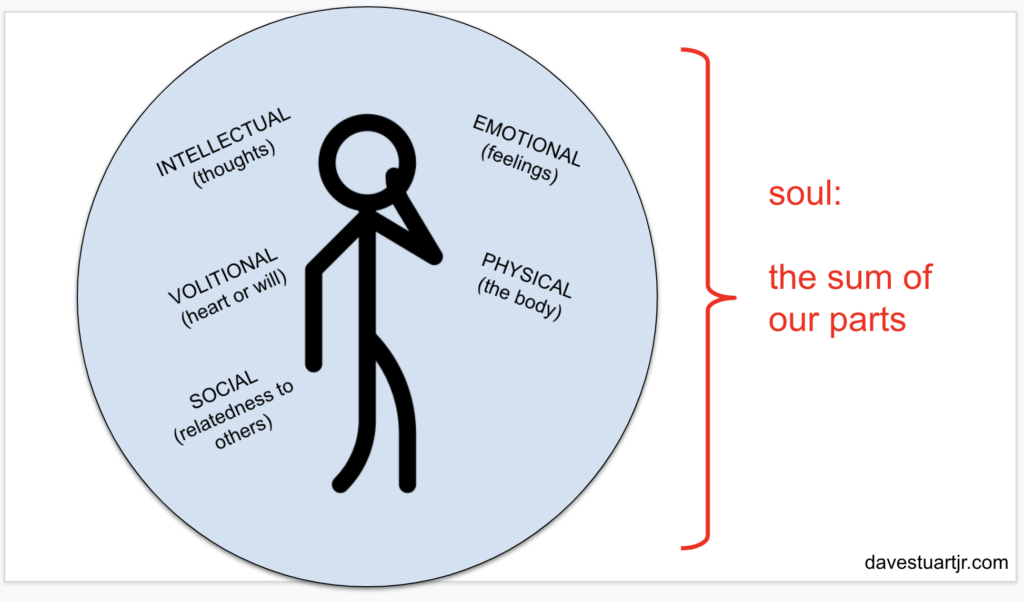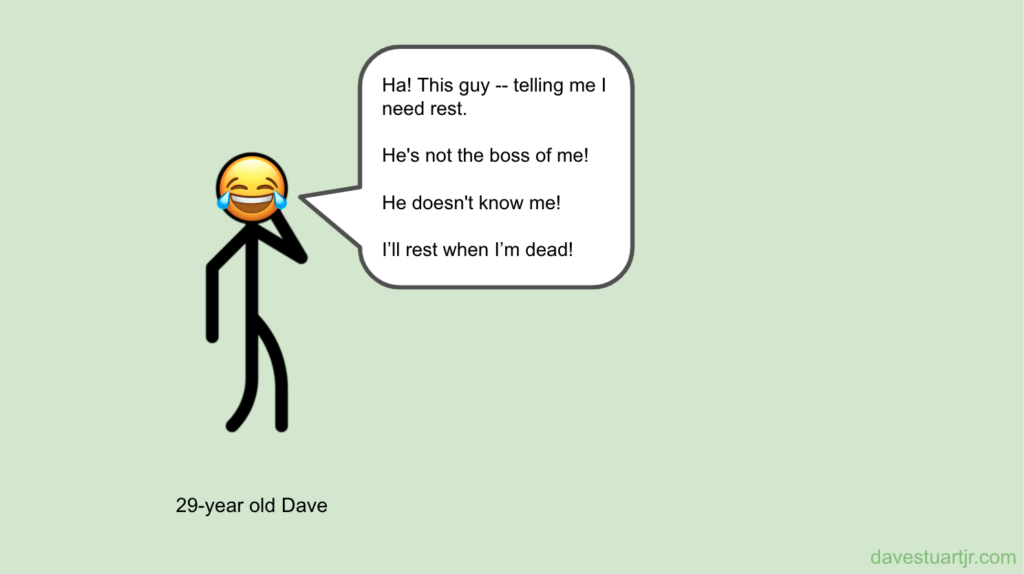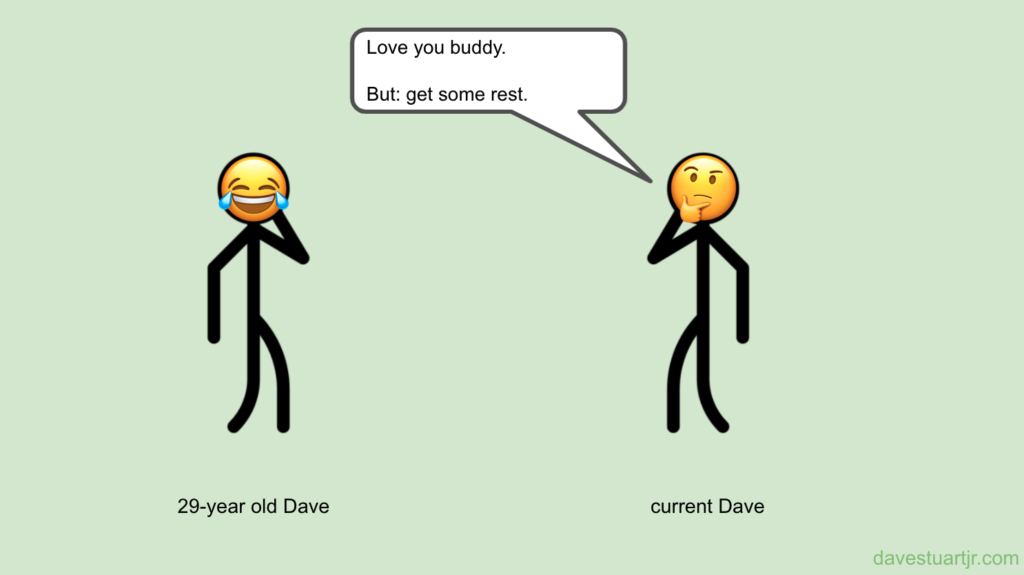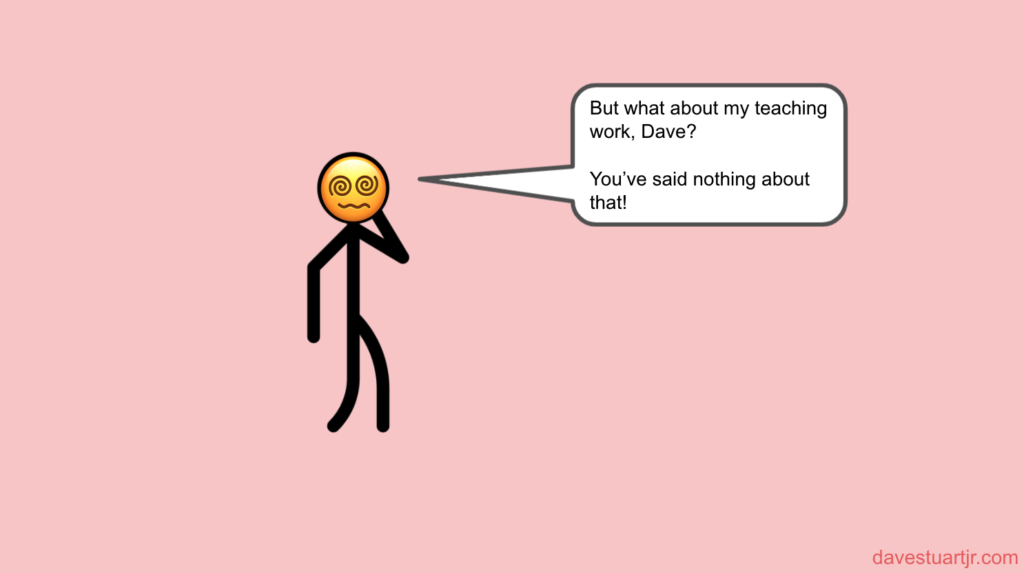The late USC philosopher Dallas Willard used to describe the body like a battery pack for the soul. For about a year, that definition didn't make much sense to me. But lately, it has started to click and has been helping me think better about rest in my life as a husband, father, teacher, and writer.
First, we've got to go back to an idea I introduced in the summer in “On the Teaching of Souls.” It's a pretty mundane observation: you and I experience life intellectually, emotionally, physically, socially, and volitionally. These parts of our person are woven together into something that feels like a heckuva lot more than a physical body. The wonderful tools of science may today only see the human as a physical creature, but the riches of human wisdom over the centuries can help us to see something more. Willard's word for the totality of our being is one of these older ideas: soul.
Here's an over-simplified picture:

Two students of Willard's, Bill and Kristi Gaultiere, have this insightful way of describing it:
Notice that your soul isn't a wispy little ghost inside you that floats up to heaven when you die, like it's portrayed in the movies. It's actually your whole person. Flowing out from deep inside you, it encompasses your body and expands out into your social world. In other words, your soul is so large that your body is actually inside your soul. That's why people in the same room can feel each other's energy and mood, even without talking.
The Gaultieres in Journey of the Soul: A Practical Guide to Emotional and Spiritual Growth
That bolded sentence is key: our bodies exist within our souls. Kind of like batteries exist within our phones and laptops.
Which brings us to REST — the fifth discipline of time management life stewardship. REST is about charging the battery of our being, and there's absolutely no way to teach and live to your full potential without getting good at resting. And, like getting good at anything, this requires thought and practice and, oddly, work.


A few helpful ideas about rest for educators
Now, in no particular order, a few things I've learned about REST as I've practiced it over the past few years.
Resting only when you're completely exhausted is like filling your car's gas tank only after it's empty. I used to deprive myself of sleep — staying up too late for extra work time or extra free time — for days on end, and then once my body had had it I'd binge on sleep over a weekend or I'd get a cold. This is the wrong kind of living in the moment. I give it zero stars.
Think of rest as depressurizing the body, mind, and will. In other words, it's not just sleep. It's sitting in the woods or a park for twenty minutes after a hard day of teaching. It's putzing around in your office or yard or garage or junk drawer — leisurely, without a firm agenda. It's making a cup of coffee on a Saturday morning and picking up one of those magazines that you subscribe to but never have time to read. It's letting your kids watch a show once in a while so you can stare out the window for a minute and think.
Another way to think of rest: a ceasing from striving. Sleep is a great example of this ceasing as even our consciousness stops striving and whole parts of our body shut down.
But again: it's not just sleep.
- You can cease from striving for ten minutes during your prep with a simple five-out-five-in.
- You can cease from striving tonight with your spouse by saying, “Hey, want to just go take a ten minute walk?”
- You can wake up on a Saturday morning and watch a movie — my friend Jay says that's the best way to start a day. He's worked through a big chunk of the best movies of all time lists that film buffs make.
But that last example with Jay is a good one because he's doing something without striving at it. It's leisurely.
When it comes to sleep, be hygienic. Real basic, we all know this stuff by now.
- No screens an hour before bed.
- Bedroom as dark as you can make it.
- Consistent bedtime each night.
- Consistent wake-up each morning.
Simple? Yes. Easy? No — at least not for me.
Resting well takes work. Like lots of life's truths, it's paradoxical. But like all human pursuits, intentional practice is required for getting good at resting. And since rest is something that we need in order to keep living, anyway, we might as well work at getting good at it.
You can rest while being with others. But restfully being with others isn't as simple as having them serve you stuff on platters. It's getting to the internal spot of, “I'm okay being just me right now. And I'm glad that you're just you.” It's not a thing I've come close to mastering yet, but now and again I get glimpses.
One of the quickest ways to get better at rest is to challenge yourself to 24 hours straight of it each weekend. You can do Friday night to Saturday night, Saturday morning to Sunday morning, Saturday night to Sunday night, Sunday morning to Monday morning — totally up to you. But start your challenge with this question: What would it look like for me to cease from striving for 24-hours each weekend?
For you, that might mean no mowing the lawn; for me, mowing the lawn totally works because it's a time for me to think and process or listen to an enjoyable book. For you, it might mean asking someone to help with your children for part of the day so you can go take a long walk or soak in a warm bath or take a nap; for me, it means not having a huge plan for things to do with my kids but to see what develops as the day progresses.

And finally: getting great at rest means we can get awesome at education. Remember the thing I started with, about how the body is a battery pack for the soul? Imagine what strength of intellect and emotion and will you could bring to the problems that face you as a teacher if you were actually fully rested. It's not a state that comes overnight, but through persistence and practice, you'll come to see what I mean.
Teaching right beside you, with much 
DSJR
Want a dedicated group of thoughtful colleagues to explore the roots of time management life stewardship with this fall? Sign up for this waitlist and I'll be in touch soon.

Susan Barber says
You should read John Mark Comer’s book The Ruthless Elimination of Hurry if you haven’t already.
Dave Stuart Jr. says
Insanely good, Susan. I just love that book.